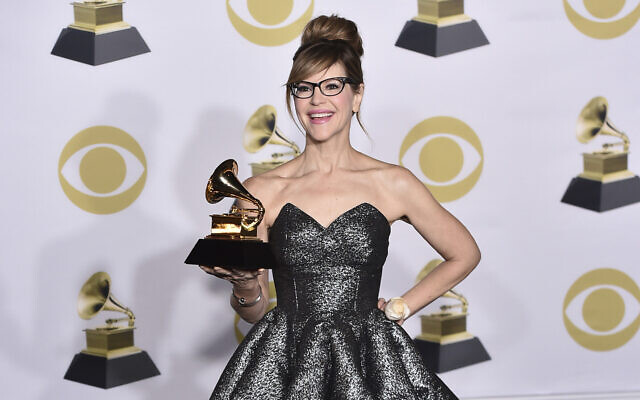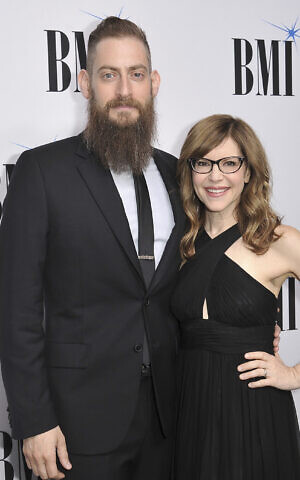In the 26 years since Lisa Loeb gained international fame with her platinum No. 1 single, “Stay (I Missed You),” the award-winning singer-songwriter has soared from one success to another.
On September 26, she plans to perform an acoustic cover of her gold 1995 debut album “Tails” on Looped, in honor of the record’s 25th anniversary.
Among myriad accomplishments, she’s won a Grammy and a Brit Award, released 15 studio albums — including five for children — and published two kids’ books with accompanying music. She’s guest-starred on TV shows, voiced popular children’s cartoon characters, married and started a family, established The Camp Lisa Foundation which sends “underserved” kids to summer camp, and launched her own eyewear collection. She’s also reconnected with her Jewish roots — a bond that has strengthened during the pandemic — and, earlier this year, released her newest studio album, “A Simple Trick to Happiness.”
“I’ve always been somebody, ever since I was a little kid, who has had a lot on my plate and done a lot of projects at once,” Loeb, 52, told The Times of Israel in a phone call from her Los Angeles home. “I was going through some of my papers from when I was a kid, and I saw something that a [high school] teacher had written. It said, ‘Although Lisa’s grade could be higher, I know she’s doing so many different things right now.’”

Lisa Loeb at the Tribeca Film Festival in 2019. (Juan Patino Photography)
“At the time I think I was in an independent movie, DJing at a radio station and at parties, in a play, in a cover band, and the teacher said, ‘I would rather see her doing all the things that Lisa Loeb does, than just making a good grade in my class.’ There’s something in me that wants to do everything all the time. My focus now is just to figure out how to be where I am when I’m there,” said Loeb.
Being in the moment is a theme that permeates many of the 11 original tracks in “A Simple Trick to Happiness,” which Loeb co-wrote with Rich Jacques. In the song “This is My Life,” Loeb reflects, “Maybe I should take some time and practice staring at the wall.” The official music video for “Another Day” features the musician doing tedious housework, a nod to life’s occasional monotony. But perhaps most poignant is “For the Birch,” inspired by two powerful women.
“The song was originally inspired by a picture of my grandmother and some of her cousins — it might be her friends — back in the early 1900s, and they’re having such a great time,” Loeb said. “They just look very confident.”
“Maybe women were in a different place than men and maybe they weren’t always equal on paper, but I think sometimes they were often very powerful and in charge,” she said. “When you come against things that are difficult, sometimes the best approach is just to accept them and buck up, get strong and move on.”
“[For the Birch] says both of those things,” Loeb said. The song honors her friendship with world-famous songwriter Allee Willis, who died in December 2019. Willis composed for band Earth Wind & Fire, wrote the theme song for Friends and co-wrote “The Color Purple.”
“She was so no-nonsense. She passed away on Christmas Eve last year. On one hand we could complain to each other for an hour about some difficult situation, but in the end we would just brush ourselves off, get up, and do the next thing,” she said.
“A Simple Trick to Happiness” is largely “about having intention and paying attention,” said Loeb. The singer said that it’s important to differentiate reality from the drama you think it may be.
“It’s important to be able to be in your experiences and digest them and maybe even complain about them to your dear friends, but also it’s important to find a way out on the other side. Allowing yourself to experience your life, that’s what makes life rich,” she said.
Part of what enriches Loeb’s own life is her proud Jewish identity and involvement in her Jewish community. Raised Reform in Dallas, Texas, Loeb fondly recalls participating as a family in “the hallmark holidays: Passover, Rosh Hashanah, Yom Kippur, Sukkot.”

Lisa Loeb poses in the press room with the best children’s album award for ‘Feel What U Feel’ at the 60th annual Grammy Awards at Madison Square Garden on January 28, 2018, in New York. (Photo by Charles Sykes/Invision/AP)
“Hanukkah was a main one for us,” she said, “even though I know it’s not traditionally one of the main holidays. And we went to religious school every week and were all bar and bat-mitzvahed in my family. We did all the highlights of the Jewish culture and traditions.”
Yet Loeb felt “a lot of guilt associated with being Jewish. Not that I didn’t want to be Jewish; I wasn’t quite feeling a connection to it personally… I hadn’t really locked in with the deep meaning.”
It wasn’t until her early 30s that everything changed for Loeb, when she happened upon a Rosh Hashanah service at Ohr HaTorah synagogue in Los Angeles led by Rabbi Mordecai Finley.
“I didn’t realize that services went on all day — I hadn’t really ever done that before,” Loeb said. “But it was so interesting. The rabbi really explained the prayers and the history, and the essence behind the holidays and how they are connected, and he just kept going deeper and deeper and deeper, with these same prayers that I had said my whole life. All of a sudden I got very interested.”

Lisa Loeb, right, and Roey Hershkovitz arrive at the 67th annual BMI Pop Awards on Tuesday, May 14, 2019, at the Beverly Wilshire Hotel in Beverly Hills, Calif. (Photo by Richard Shotwell/Invision/AP)
Loeb attended Yom Kippur services a week later, and then began to attend Finley’s classes.
“I realized, wow, this is important to me and I’m looking forward to continuing to question, to study, to learn, to understand, and it deepened my connection,” she said.
“It was something that I thought about more every day. And then instead of questioning and rejecting, I was questioning and diving in deeper; I realized that’s also part of the Jewish tradition. It became exciting to me,” she said.
Today, Loeb, her husband Roey Hershkovitz, 41, (whose family stems from Israel), and children Lyla, 10, and Emet, 8, embrace a meaningful Jewish lifestyle — something that flourished as a result of COVID-19. Hershkovitz is the vice president of Capitol Studios and Digital Studios Universal Music Group.
“Because I’m not traveling as much, I see the cycles of the week. Normally I wouldn’t be home every Friday night. But we’re really home; there is no other place,” Loeb said. “So we’ve made challah, we regularly do Shabbat dinner, I talk to the kids about the holidays a lot and what they mean and we read different books about them and we try to cook different foods.”
“Also through Zoom, my rabbi leads lots of classes online… the synagogue is pretty far from where we live, so it’s really nice to be able to have that at your fingertips at any moment,” she said.
“I don’t have free time, but I can be out walking or cooking dinner and listening to a great teaching instead of needing to take that time to drive to a place to there in person. Everything is open to us now. It’s just amazing how many resources we have online,” said the singer.
Related posts:
Views: 0
 RSS Feed
RSS Feed

















 September 26th, 2020
September 26th, 2020  Awake Goy
Awake Goy  Posted in
Posted in  Tags:
Tags: 
















